Anpassungsfähigkeit und Resilienz des Finanzsystems
Diese Forschungsgruppe untersucht kritische Aspekte der Anpassungsfähigkeit und Widerstandsfähigkeit von Finanzsystemen. Sie analysiert die Auswirkungen von Naturkatastrophen auf Finanzsysteme, die Auswirkungen politischer Präferenzen für die grüne Transformation und die Bedeutung von Kultur in den Volkswirtschaften.
Forschungscluster
Finanzresilienz und RegulierungIhr Kontakt

- Abteilung Finanzmärkte
PROJEKTE
08.2022 ‐ 07.2025
OVERHANG: Schuldenüberhang und grüne Investitionen – die Rolle von Banken für den klimafreundlichen Umgang mit emissionsintensiven Anlagenvermögen
Bundesministerium für Bildung und Forschung (BMBF)
Ziel von OVERHANG ist es, die Rolle von Banken für den klimafreundlichen Umgang mit emissionsintensiven Anlagevermögen zu untersuchen. Hierdurch sollen politikrelevante Erkenntnisse zu Finanzregulierung, staatlich kontrollierter Kreditvergabe und Finanzstabilität identifiziert sowie eine Sensibilisierung der verschuldeten Akteurinnen und Akteuren erreicht werden.
Das Projekt wird vom Bundesministerium für Bildung und Forschung (BMBF) finanziert.
01.2015 ‐ 12.2019
Interactions between Bank-specific Risk and Macroeconomic Performance
Deutsche Forschungsgemeinschaft (DFG)
07.2016 ‐ 12.2018
Relationship Lenders and Unorthodox Monetary Policy: Investment, Employment, and Resource Reallocation Effects
Leibniz-Gemeinschaft
We combine a number of unique and proprietary data sources to measure the impact of relationship lenders and unconventional monetary policy during and after the European sovereign debt crisis on the real economy. Establishing systematic links between different research data centers (Forschungsdatenzentren, FDZ) and central banks with detailed micro-level information on both financial and real activity is the stand-alone proposition of our proposal. The main objective is to permit the identification of causal effects, or their absence, regarding which policies were conducive to mitigate financial shocks and stimulate real economic activities, such as employment, investment, or the closure of plants.
Referierte Publikationen

Commitment or Constraint? The Effect of Loan Covenants on Merger and Acquisition Activity
in: Finance Research Letters, June 2022
Abstract
We investigate how loan covenants associated with potential target firms affect takeover deals. We propose two possible channels. Under a discipline channel, the target firm becomes an attractive candidate for takeovers and merger deals are facilitated. Under a constraint channel, covenants hinder merger activity. We find support for the latter channel. Takeover likelihood is lower, deal failures are more common, the likelihood of price renegotiation is higher, and acquisition premium is lower when the target is bound by covenants. Covenant tightness exacerbates this effect.
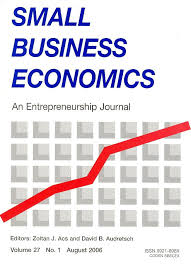
Bank Failures, Local Business Dynamics, and Government Policy
in: Small Business Economics, Nr. 4, 2022
Abstract
Using MSA-level data over 1994–2014, we study the effect of bank failures on local business dynamics, in the form of net business formation and net job creation. We find that at least one bank failure in the metropolitan statistical area (MSA) with the mean population prevents approximately 475 net businesses from forming in that area, compared with MSAs that experience no bank failures, ceteris paribus. The equivalent effect on net job creation is 16,433 net job losses. Our results are even stronger for small businesses, which are usually more dependent on bank-firm relationships. These effects point to significant welfare losses stemming from bank failures, highlighting an important role for government intervention. We show that the Troubled Asset Relief Program (TARP) is effective in reducing the negative effects of bank failures on local business dynamics. This positive effect of TARP is quite uniform across small and large firms.

Banking Reform, Risk-Taking, and Accounting Quality: Evidence from Post-Soviet Transition States
in: Journal of International Accounting Research, Nr. 1, 2022
Abstract
The drastic banking reform within Central and Eastern Europe following the collapse of the Soviet Union provides an ideal quasi-experimental design to examine the causal effects of institutional development on accounting quality (AQ). We find that banking reform spurs significant improvement in predictive power of earnings and reductions in earnings smoothing, earnings-inflating discretionary provisions, and avoidance of reporting losses. These effects hold under alternative model specifications and after considering concurrent institutional developments. In contrast, corporate reform shows no such effects, refuting the alternative explanation that unobserved factors affect both reform speed in general and the quality of financial reporting. We further identify four specific reformative actions that are integral to the drastic banking reform process where prudential regulation contributes the most to the observed AQ improvement. It supports the conjecture that banking reform improves AQ by reducing banks' risk-taking behaviors and, as a result, their motive behind accounting manipulation.
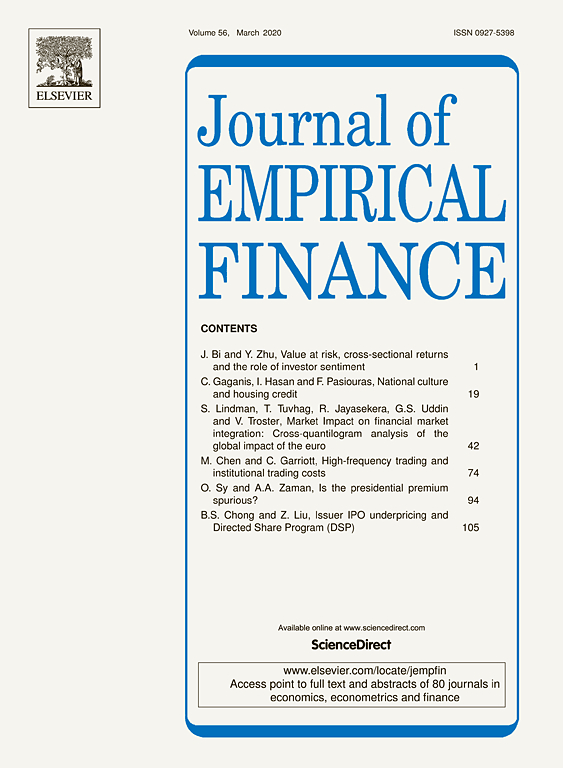
Income, Trading, and Performance: Evidence from Retail Investors
in: Journal of Empirical Finance, March 2022
Abstract
We examine whether household income influences the trading styles of retail investors and their investment performance. To investigate this question, we use a unique dataset of branch-level trading that contains all retail investors and observe that those investors with high income trade more and earn significantly higher returns in the stock market. In addition, this income effect becomes stronger for highly risky stocks, such as gambling or lottery-like stocks. These findings are in line with the information model theorized by Peress (2004) in which wealthy investors take extra risks by trading more stocks.

Understanding Climate Activism: Who Participates in Climate Marches Such As “Fridays for Future” and What Can We Learn from It?
in: Energy Research and Social Science, February 2022
Abstract
Young people are marching around the globe to ask for measures against climate change and to protect the environment. Using novel survey data, we ask who participates in such powerful movements and what can be learned from our findings. The survey was conducted in German and is based on answers from more than 600 participants. We find that survey respondents are less likely to participate in climate marches like “Fridays for Future” in case they trust more in (large) corporations suggesting a link between trust and climate activism. We also ask whether worries about climate change or attitudes towards more environmentally friendly behavior match their participation frequency in climate marches. Results reveal that respondents being more worried about climate change or the environment tend to participate more often in marches addressing these concerns. Similarly, participation in climate marches correlates positively with acting environmentally sustainable. Hence, our findings might be relevant for corporations in case they want to keep the support of young customers participating in climate marches.
Arbeitspapiere

Capital Requirements, Market Structure, and Heterogeneous Banks
in: IWH Discussion Papers, Nr. 15, 2022
Abstract
Bank regulators interfere with the efficient allocation of resources for the sake of financial stability. Based on this trade-off, I compare how different capital requirements affect default probabilities and the allocation of market shares across heterogeneous banks. In the model, banks‘ productivity determines their optimal strategy in oligopolistic markets. Higher productivity gives banks higher profit margins that lower their default risk. Hence, capital requirements indirectly aiming at high-productivity banks are less effective. They also bear a distortionary cost: Because incumbents increase interest rates, new entrants with low productivity are attracted and thus average productivity in the banking market decreases.

Covered Bonds and Bank Portfolio Rebalancing
in: Norges Bank Working Papers, Nr. 6, 2021
Abstract
We use administrative and supervisory data at the bank and loan level to investigate the impact of the introduction of covered bonds on the composition of bank balance sheets and bank risk. Covered bonds, despite being collateralized by mortgages, lead to a shift in bank lending from mortgages to corporate loans. Young and low-rated firms in particular receive more credit, suggesting that overall credit risk increases. At the same time, we find that total balance sheet liquidity increases. We identify the channel in a theoretical model and provide empirical evidence: Banks with low initial liquidity and banks with sufficiently high risk-adjusted return on firm lending drive the results.
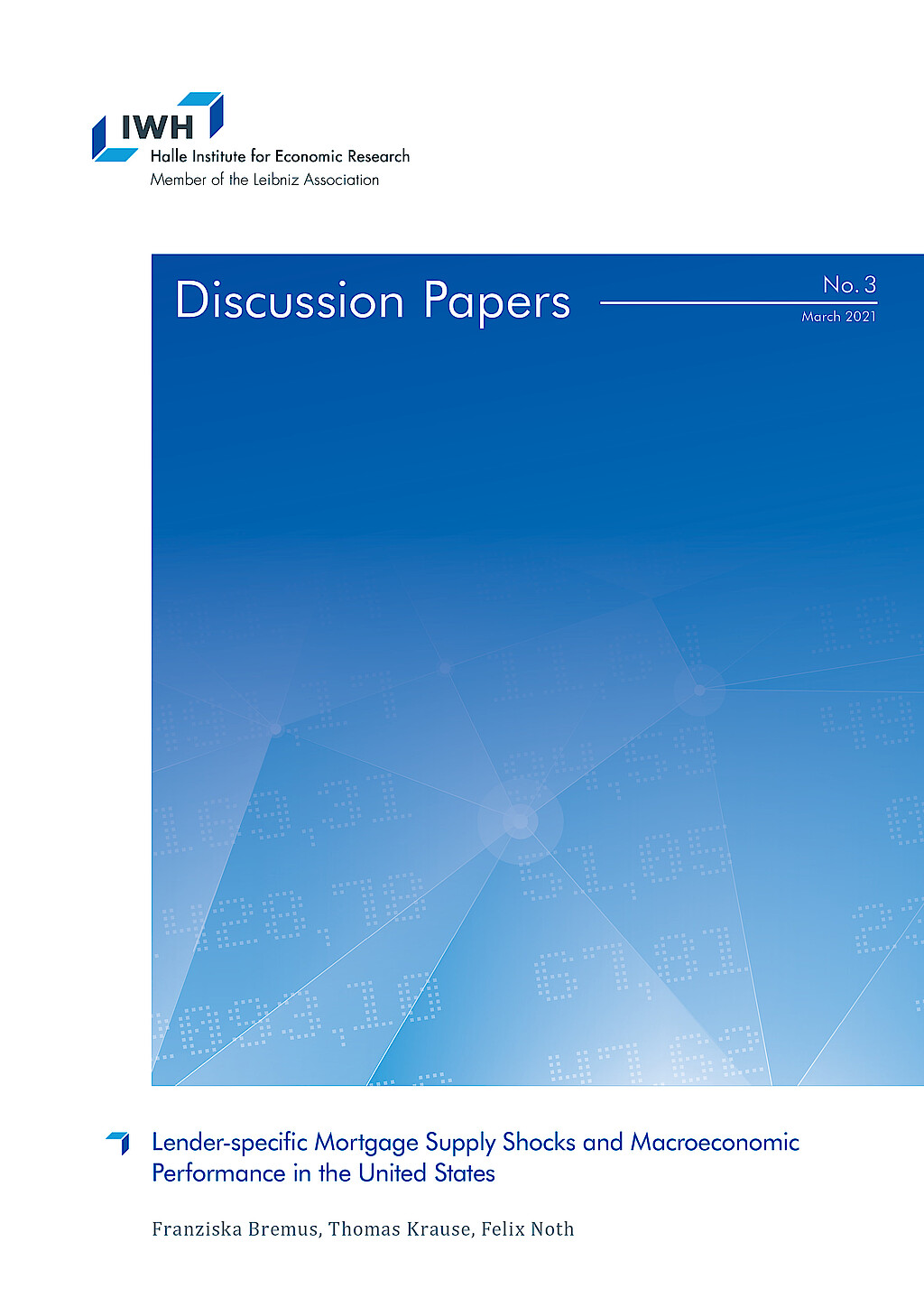
Lender-specific Mortgage Supply Shocks and Macroeconomic Performance in the United States
in: IWH Discussion Papers, Nr. 3, 2021
Abstract
This paper provides evidence for the propagation of idiosyncratic mortgage supply shocks to the macroeconomy. Based on micro-level data from the Home Mortgage Disclosure Act for the 1990-2016 period, our results suggest that lender-specific mortgage supply shocks affect aggregate mortgage, house price, and employment dynamics at the regional level. The larger the idiosyncratic shocks to newly issued mortgages, the stronger are mortgage, house price, and employment growth. While shocks at the level of shadow banks significantly affect mortgage and house price dynamics, too, they do not matter much for employment.
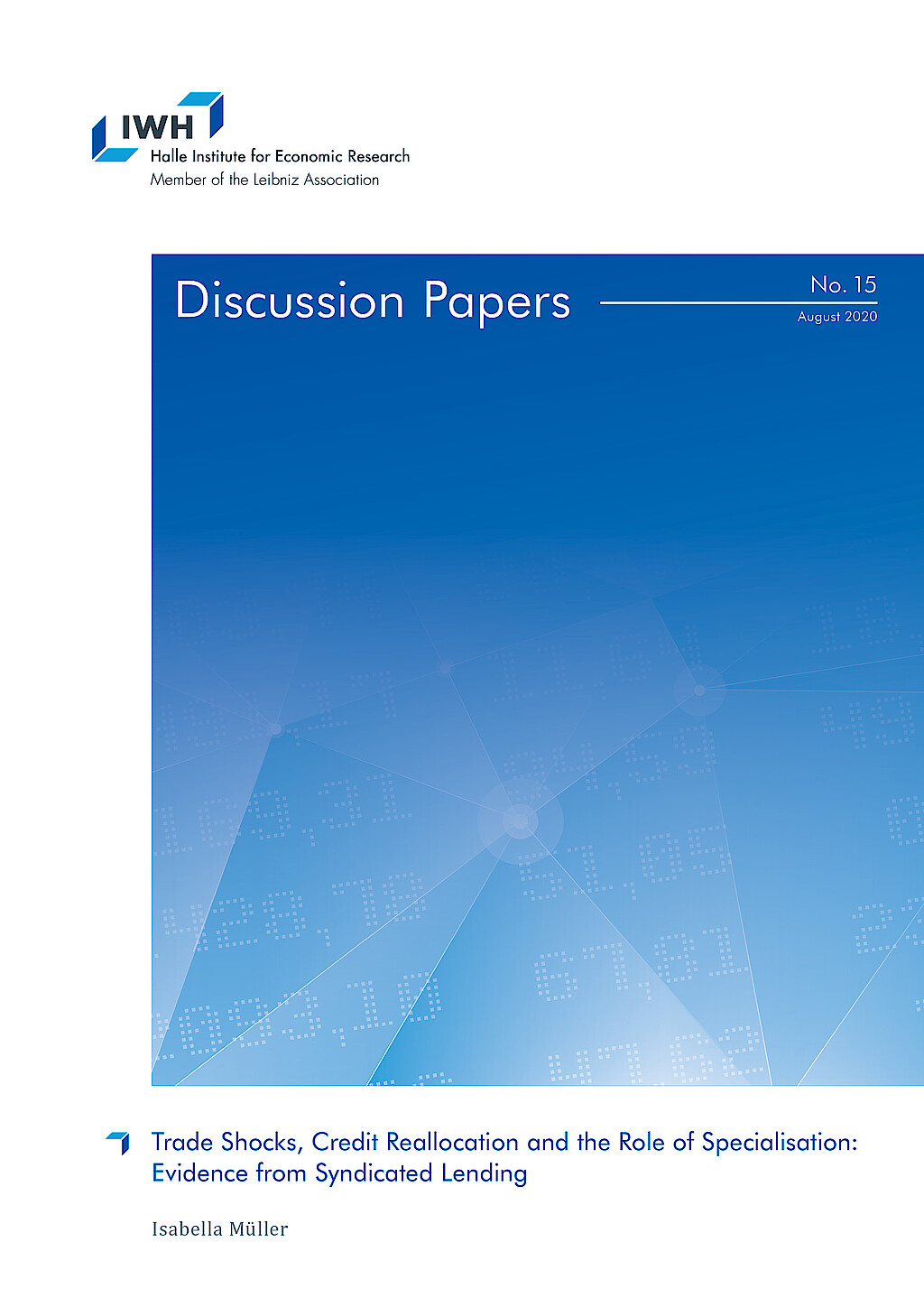
Trade Shocks, Credit Reallocation and the Role of Specialisation: Evidence from Syndicated Lending
in: IWH Discussion Papers, Nr. 15, 2020
Abstract
This paper provides evidence that banks cut lending to US borrowers as a consequence of a trade shock. This adverse reaction is stronger for banks with higher ex-ante lending to US industries hit by the trade shock. Importantly, I document large heterogeneity in banks‘ reaction depending on their sectoral specialisation. Banks shield industries in which they are specialised in and at the same time reduce the availability of credit to industries they are not specialised in. The latter is driven by low-capital banks and lending to firms that are themselves hit by the trade shock. Banks‘ adjustments have adverse real effects.
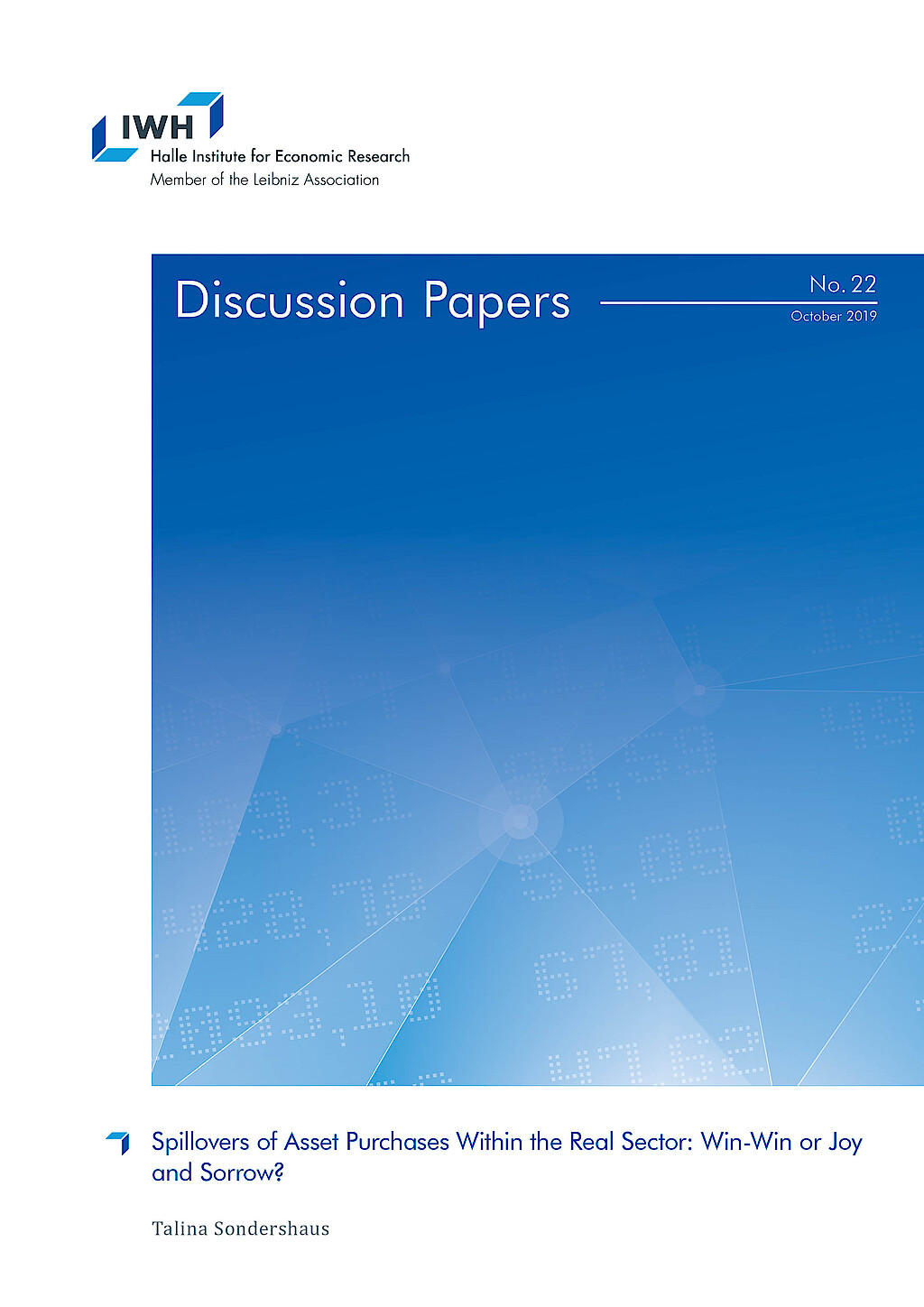
Spillovers of Asset Purchases Within the Real Sector: Win-Win or Joy and Sorrow?
in: IWH Discussion Papers, Nr. 22, 2019
Abstract
Events which have an adverse or positive effect on some firms can disseminate through the economy to firms which are not directly affected. By exploiting the first large sovereign bond purchase programme of the ECB, this paper investigates whether more lending to some firms spill over to firms in the surroundings of direct beneficiaries. Firms operating in the same industry and region invest less and reduce employment. The paper shows the importance to consider spillover effects when assessing unconventional monetary policies: Differences between treatment and control groups can be entirely attributed to negative effects on the control group.



















